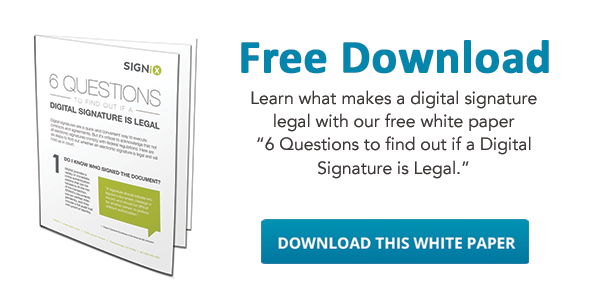E-signatures are supposed to make life easier for companies. They’re supposed to save businesses money. They’re supposed to carry the same legal and compliance weight as pen and paper.
So why, then, are so many e-signature vendors, including some of the most well-known, failing at all of these key benchmarks?
The answer is actually very simple: Many e-signature companies are focused more on marketing tactics than on sound, defensible technology. That means their e-signatures don’t have the integrity, validity or compliance that companies need.
Yikes.
It’s a trap—one that we’ve heard about first-hand from scores of clients who’ve tried e-signatures from other vendors and then came to us.
Here’s how the trap works:
- E-signature vendors spend millions of dollars on highly effective marketing campaigns that tout
 their products as the most popular “brand name” solutions on the market.
their products as the most popular “brand name” solutions on the market. - These vendors claim to provide technology compliant with industry standards, but rarely express how their technology meets key industry regulations.
- Customers, many of whom are often entering the e-signature world for the first time, are unaware of the appropriate technology-related questions to ask. They take “compliance stickers” as full truths.
- When customers begin to use the technology, they realize that it is not actually designed for their specific industry and is not appropriate for their company.
- Industry-mandated compliance regulations, long-term validity and support are all subpar.
- Companies realize they’ve invested substantial time, effort and resources into a product that could jeopardize their good standing in the market.
- Those who championed the purchase realize they bought a solution that increases company risk, rather than reduces it, and they have potentially endangered their position in the company and possibly the company as a whole.
- The e-signature service must be scrapped, and companies are back to using pen and paper until they can find an e-signature vendor they can trust with compliance and technology.
It’s an ugly circle that puts you back to where you started—only this time you’re more frustrated, out a large amount of money and left unraveling a tangled web of compliance issues.
Outsmarting the trap
Fortunately, not every e-signature vendor operates in this manner. But since many do, it is essential that companies looking to invest in e-signature technology understand how to avoid this dangerous trap. The key is to build a relationship with an e-signature company that has the technology, expertise and support to keep your business compliant and your signatures valid forever. To find that kind of partner, heed the following tips:
- Question the term of validity. No matter the industry your company works in, you will need your signed documents to remain valid for more than a few months. However, many e-signature vendors, including some of the largest and most popular ones, don’t support long-term validity. Their technology often links the signature to a server instead of permanently embedding it into the signed document.
- Ask about the technology’s infrastructure. To the same end, dig deep beyond the surface of the vendor’s e-signature technology and discuss the details. Ask about digital signing certificates, public key infrastructure, comprehensive audit trails, tamper seals and identity authentication. If you’re uncomfortable with high-level tech discussions, loop your company’s IT professionals into the conversation—but don’t skim over this important dialogue.
- Uncover the truth of compliance. Many industries have their own set of rules related to e-signatures and digital documents. For example, in healthcare, technology must be HIPAA-compliant. In life sciences, you’ll need to check on the 21 CFR Part 11 mandate. In tax accounting, you’ll need to review IRS standards. The list goes on. Check your industry’s specific mandates and then ask the vendor how its technology complies with these regulations. Demand specifics—don’t rely on a general statement placed on a company’s website. Unfortunately, those statements may not be accurate.
- Investigate expertise in your industry. Industry prowess shouldn’t be left to you alone. What if regulations change? You’ll want a vendor who is just as knowledgeable on your area of practice as you are. So be specific in your questions relating to regulatory standards and appropriate usage and uncover their experience and expertise in your industry.
Like any book, a cover can be misleading. As you search for the right e-signature solution for your business, avoid the bright, shiny draw of popularity and uncover the substance that lies beneath the surface.
That goes for us, too. While we at SIGNiX are happy to report that we support industry compliance with our Independent E-Signatures™ in a number of highly regulated industries (including healthcare, financial services, life sciences, insurance and many more), ask us the tough questions. We love sharing the intricacies of our technology and the ways in which it will protect and sustain your most important documents.
To learn more about e-signature technology that works for companies that rely on compliance, download this free white paper to find out if a digital signature is legal.
%20formatted-1.png?width=2528&height=739&name=SIGNiX%20Logo%20Main%20(white)%20formatted-1.png)

